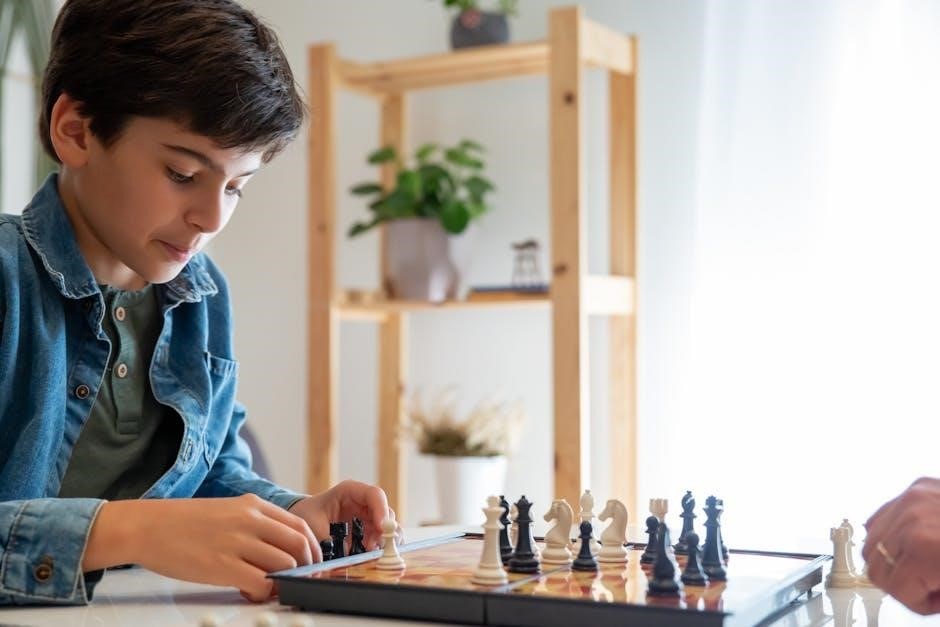
Chess puzzles are essential tools for learning and improving chess skills. Available in PDF format‚ they offer a wide range of challenges for players of all levels. These puzzles‚ collected from practical games‚ cover various themes like checkmate‚ tactics‚ and endgames. They provide a convenient and portable way to practice and enhance your chess understanding. Whether you’re a beginner or an advanced player‚ chess puzzles in PDF format are a valuable resource for refining your strategies and sharpening your problem-solving abilities.
1.1 What Are Chess Puzzles?
Chess puzzles are exercises designed to improve chess skills through practice. They typically present a specific position on the chessboard‚ challenging the solver to find the best move or sequence of moves. These puzzles are often derived from real games and cover various aspects of chess‚ such as checkmates‚ tactical combinations‚ and endgame strategies. They are categorized by difficulty‚ ranging from simple to complex‚ making them accessible to players of all skill levels. Chess puzzles are widely available in PDF format‚ offering a convenient way to train and enhance your chess abilities at home or on the go.
1.2 Importance of Chess Puzzles in Training
Chess puzzles play a vital role in training by enhancing tactical vision‚ problem-solving skills‚ and strategic thinking. Regular practice with these exercises strengthens a player’s ability to recognize patterns and anticipate moves; They also improve discipline and focus‚ essential qualities for competitive play. Puzzles collected from real games provide practical insights‚ helping players apply theoretical knowledge in actual scenarios. For players of all levels‚ chess puzzles are a fundamental tool for consistent improvement and mastery of the game. They are particularly valuable for refining techniques and preparing for tournaments or casual matches.

Types of Chess Puzzles
Chess puzzles come in various forms‚ including checkmate‚ tactical‚ endgame‚ and combination exercises‚ each designed to enhance different skills and understanding of the game.
2.1 Checkmate in One Move Puzzles
Checkmate in one move puzzles are classic challenges where the solution requires delivering an immediate checkmate. These puzzles test a player’s ability to spot forced wins quickly. Often derived from real game positions‚ they focus on tactical patterns like pins‚ forks‚ and skewers. Solving these puzzles sharpens tactical vision and decision-making skills. They are ideal for players seeking to improve their endgame precision and speed. Resources like “200 Perplexing Chess Puzzles” offer extensive collections of such puzzles‚ catering to both beginners and advanced players. Regular practice enhances the ability to recognize winning opportunities instantly.
2.2 Tactical Problems and Combinations
Tactical problems and combinations are essential for improving chess skills. These puzzles focus on recognizing patterns like forks‚ skewers‚ and pins to gain a strategic advantage. Often sourced from real games‚ they present scenarios requiring precise moves to win material or force a favorable position. Solving tactical problems enhances foresight and reaction speed. Resources like “200 Perplexing Chess Puzzles” and “Chess Puzzles” by Martin Bennedik offer diverse combinations to practice. Regular practice of these puzzles sharpens analytical skills and prepares players for competitive scenarios. They are highly recommended for players seeking to refine their tactical execution and overall gameplay strategy.
2.3 Endgame Studies
Endgame studies are specialized chess puzzles that focus on the final stages of a game. These problems highlight key techniques like pawn promotion‚ zugzwang‚ and piece coordination. Often composed to illustrate specific themes‚ they help players master fundamental endgame principles. Resources such as “200 Perplexing Chess Puzzles” include sections dedicated to endgame scenarios‚ offering challenges that refine players’ abilities to convert advantages into wins. These studies are invaluable for improving strategic insight and decision-making in the critical endgame phase‚ making them a staple in every player’s training regimen. They are widely available in PDF formats for convenient practice.
2.4 Combination Exercises
Combination exercises are advanced chess puzzles that require players to execute a series of forced moves to achieve a specific goal. These exercises often involve sacrifices‚ forks‚ and pins‚ challenging players to think critically and anticipate multiple outcomes. Resources like “200 Perplexing Chess Puzzles” and “Chess Puzzles” by Martin Bennedik include detailed combination exercises‚ offering players the opportunity to refine their tactical execution. These exercises are particularly useful for improving pattern recognition and strategic planning‚ making them a key component of any comprehensive chess training regimen. They are widely available in PDF formats for convenient study and practice.
Difficulty Levels in Chess Puzzles
Chess puzzles are categorized into easy‚ medium‚ and hard levels‚ catering to players of all skill levels. Easy puzzles (300) are ideal for beginners‚ medium (178) for intermediate players‚ and hard (72) for advanced players‚ totaling 550 puzzles designed to challenge and improve skills progressively. These levels ensure a structured learning path‚ helping players refine their tactics and strategies step-by-step. The graded difficulty enhances problem-solving abilities and prepares players for competitive play. Each level builds on the previous‚ fostering continuous improvement and mastery of chess concepts.
3.1 Easy Puzzles for Beginners
Easy chess puzzles are designed for newcomers to the game‚ offering a gentle introduction to basic tactics and strategies. These puzzles typically involve simple checkmates‚ straightforward tactical exercises‚ and fundamental positional concepts. With clear diagrams and solutions provided‚ beginners can learn essential moves and patterns without feeling overwhelmed. The puzzles focus on building confidence and foundational skills‚ such as recognizing common threats and executing basic combinations. This level is perfect for players just starting their chess journey‚ helping them understand the game’s mechanics and develop a solid grasp of key principles. Regular practice with easy puzzles lays the groundwork for future success.
3.2 Medium-Level Challenges
Medium-level chess puzzles are ideal for players who have mastered basic tactics and seek to refine their skills. These puzzles introduce more complex motifs‚ such as multi-piece interactions and deeper strategic concepts. They often involve recognizing hidden threats‚ executing intermediate combinations‚ and applying positional principles. Medium puzzles are designed to challenge players to think critically and anticipate outcomes. By solving these‚ players improve their tactical vision and decision-making. Available in PDF format‚ these puzzles provide a structured way to progress from foundational knowledge to advanced strategies‚ helping intermediate players bridge the gap to higher-level play.
3.3 Hard Puzzles for Advanced Players
Hard chess puzzles are designed for experienced players seeking to refine their mastery of complex tactics and strategies. These puzzles often involve intricate combinations‚ deep calculation‚ and precise execution. They require advanced skills‚ such as recognizing subtle patterns‚ managing tempo‚ and exploiting small advantages. Hard puzzles are typically sourced from high-level games and feature challenging positions that test a player’s ability to think critically and creatively. Available in PDF format‚ these puzzles are essential for advanced players aiming to enhance their competitive edge and prepare for high-stakes tournaments. Solving them consistently can significantly elevate a player’s skill level and confidence.

Benefits of Solving Chess Puzzles
Solving chess puzzles enhances tactical vision‚ improves problem-solving skills‚ and builds discipline. Regular practice strengthens critical thinking and decision-making‚ benefiting players of all levels in their chess journey.

4.1 Improving Tactical Vision
Solving chess puzzles significantly enhances tactical vision by training players to recognize patterns‚ combinations‚ and winning opportunities. Regular practice with puzzles like checkmate in one move and tactical problems sharpens the ability to anticipate moves and plan strategies. These exercises‚ often derived from real games‚ help players develop a keen eye for weaknesses on the board. By consistently challenging oneself with various puzzles‚ players can improve their capacity to think critically and make precise decisions during actual games‚ leading to better overall performance and a deeper understanding of chess tactics.
4.2 Enhancing Problem-Solving Skills
Engaging with chess puzzles PDFs fosters critical thinking and analytical abilities‚ essential for problem-solving. By tackling various challenges‚ players learn to break down complex positions‚ evaluate options‚ and execute effective solutions. Regular practice enhances logical reasoning and adaptability‚ as puzzles often present unique scenarios requiring creative approaches. These skills not only improve chess performance but also translate to real-life challenges‚ fostering a disciplined and methodical mindset. Solving puzzles consistently sharpens the ability to identify patterns‚ prioritize moves‚ and make optimal decisions under pressure‚ making it a valuable tool for intellectual growth and strategic development. This refinement boosts overall cognitive agility and precision.
4.3 Building Discipline and Focus
Chess puzzles PDFs play a significant role in cultivating discipline and focus. Solving puzzles requires consistent effort and concentration‚ fostering a routine that translates to other areas of life. Regular practice helps players develop patience and perseverance‚ as they repeatedly analyze positions and seek optimal solutions. The structured nature of puzzles encourages mindfulness and attention to detail‚ essential for mastering chess strategies. Over time‚ this disciplined approach enhances mental clarity and the ability to maintain focus during challenging scenarios‚ both on and off the board‚ contributing to personal and intellectual growth.
Popular Chess Puzzle PDF Resources
Popular resources include “200 Perplexing Chess Puzzles” by Martin Greif and “Chess Puzzles” by Martin Bennedik‚ offering diverse challenges for all skill levels‚ downloadable in PDF format.

5.1 “200 Perplexing Chess Puzzles” by Martin Greif
“200 Perplexing Chess Puzzles” by Martin Greif is a renowned resource for players seeking to enhance their tactical and problem-solving skills. This comprehensive collection offers 200 carefully selected puzzles‚ each designed to challenge players of various skill levels. The puzzles are organized to gradually increase in difficulty‚ making it suitable for both beginners and advanced players. Each puzzle is crafted to target specific tactical motifs and patterns‚ ensuring a well-rounded improvement in chess understanding. The PDF format allows for easy accessibility and printing‚ making it a convenient tool for daily practice. Players can expect to improve their ability to recognize tactical opportunities and execute precise combinations‚ ultimately strengthening their overall game performance. By solving these puzzles‚ players develop a sharper tactical vision and a more disciplined approach to chess strategy. This book is a must-have for anyone committed to continuous improvement in the game of chess.
5.2 “Chess Puzzles” by International Correspondence Chess Master Martin Bennedik
Martin Bennedik’s “Chess Puzzles” is a highly regarded collection designed to refine tactical and defensive skills. Each lesson focuses on specific motifs and patterns‚ followed by a series of challenging puzzles. The book is structured to cater to players of all levels‚ with puzzles gradually increasing in difficulty. Bennedik’s expertise as an International Correspondence Chess Master ensures high-quality content tailored for effective learning. The PDF format makes it easy to access and print‚ providing a convenient way to practice and improve. This resource is ideal for players seeking to enhance their tactical vision‚ problem-solving abilities‚ and overall chess performance.
Customizing and Creating Chess Puzzles
Customizing chess puzzles allows players to tailor challenges to their skill level and interests. Tools enable the creation of personalized puzzles‚ adjusting difficulty and themes for enhanced learning and fun.
6.1 Tools for Generating Chess Puzzles
Various tools allow players to generate custom chess puzzles‚ catering to different skill levels and preferences. These tools enable users to create puzzles with specific themes‚ such as checkmates or tactical combinations. Some tools offer the ability to adjust difficulty levels‚ ensuring puzzles are suitable for both beginners and advanced players. Additionally‚ they allow for personalized elements‚ like adding logos or custom annotations. These tools are invaluable for coaches and players seeking tailored practice materials. They also support PDF formatting‚ making it easy to download and print worksheets for convenient study. This flexibility enhances the learning experience and makes chess practice more engaging and effective.
6.2 Adjusting Difficulty Levels
Adjusting difficulty levels in chess puzzles ensures that players of all skill levels can engage effectively. Puzzles are typically categorized into easy‚ medium‚ and hard levels‚ allowing players to progress gradually. Easy puzzles focus on basic tactics‚ while medium and hard puzzles introduce more complex scenarios. Tools and resources often include filters or settings to sort puzzles by difficulty‚ ensuring a tailored challenge. This customization helps avoid frustration for beginners and provides advanced players with suitable tests. By adjusting difficulty levels‚ players can continuously improve their skills in a structured and enjoyable manner. This adaptability makes chess puzzles versatile for all learners.
6.3 Adding Personalized Elements
Adding personalized elements to chess puzzles in PDF format enhances engagement and learning. Users can customize puzzles with their name‚ difficulty level‚ or specific themes. Some tools allow adding logos‚ creating themed puzzles‚ or focusing on particular chess skills. Personalized elements make puzzles more relevant and motivating. For example‚ coaches can create puzzles tailored to their students’ needs or interests. This feature ensures that learners engage with content that aligns with their goals‚ making practice more enjoyable and effective. Personalization also helps track progress and maintains a sense of ownership over the learning process.

Downloading and Printing Chess Puzzle Worksheets
Easily download and print free chess puzzle worksheets from various online resources. These PDFs are perfect for personal or educational use‚ offering engaging challenges for all skill levels.
7.1 Free Resources for Printable PDFs

Access a variety of free chess puzzle PDFs online‚ perfect for printing. Websites offer downloadable worksheets with puzzles ranging from basic to advanced levels. These resources are ideal for personal practice or classroom use‚ providing a structured way to improve chess skills. Many PDFs include answer sheets‚ making it easy to track progress. Whether you’re a teacher or a self-learner‚ these free resources are a great way to enhance your chess training with convenient and high-quality materials.
7.2 Worksheets with Answer Sheets
Downloadable chess puzzle worksheets with answer sheets are a fantastic resource for players seeking structured practice. These PDFs provide a wide range of puzzles‚ from basic checkmate patterns to complex tactical problems. The included answer sheets allow for self-correction‚ helping players track their progress and identify areas for improvement. Many worksheets cater to different skill levels‚ ensuring that both beginners and advanced players can benefit. This feature makes them ideal for personal study or classroom use‚ offering a comprehensive tool to enhance chess understanding and problem-solving skills effectively.